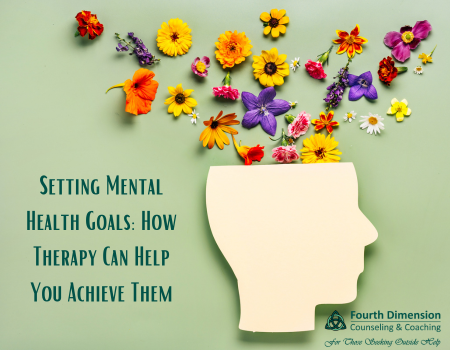Mental health is an essential aspect of overall well-being, and just like physical health, it requires attention and care. One of the most effective ways to improve and maintain mental health is by setting clear, achievable goals. Whether you’re working to manage anxiety, improve self-esteem, or develop healthier coping mechanisms, setting mental health goals can provide direction and a sense of purpose. Therapy can play a crucial role in helping you not only define these goals but also achieve them. Here’s how therapy can help you set and reach your mental health goals.
 1. Identifying Your Mental Health Needs
1. Identifying Your Mental Health Needs
The first step in setting mental health goals is identifying what you want to work on. For some, this could be managing stress, overcoming negative thought patterns, or building healthier relationships. For others, it might be addressing specific mental health conditions like depression or anxiety. Therapy provides a safe and structured environment to explore these needs and concerns in detail.
A therapist can help you identify underlying issues that may not be immediately obvious, such as unresolved trauma or long-standing beliefs that affect your mental health. With a clearer understanding of what you’re working on, you can set more targeted and relevant goals that address the root causes of your struggles.
2. Setting Realistic and Achievable Goals
When it comes to mental health, it’s easy to set broad, vague goals like “I want to feel better” or “I want to be happier.” However, these types of goals can be overwhelming and difficult to measure. Therapy helps you break down these broad desires into smaller, more realistic, and specific goals.
A therapist can guide you in creating SMART goals—Specific, Measurable, Achievable, Relevant, and Time-bound goals. For example, if your goal is to reduce anxiety, a SMART goal could be “Practice breathing exercises for 5 minutes every day for the next two weeks.” By making goals more concrete and attainable, therapy provides you with a clear roadmap to follow.
3. Developing Coping Strategies
Achieving mental health goals often involves learning new coping strategies to deal with difficult emotions, stress, or unhealthy habits. Therapy provides an opportunity to explore and practice a variety of coping tools that can be effective for different situations.
For example, cognitive-behavioral therapy (CBT) teaches you how to recognize and challenge negative thought patterns that contribute to anxiety or depression. Mindfulness and relaxation techniques can help you manage stress in the moment. A therapist will work with you to develop these skills, ensuring that you have the tools you need to stay on track as you work toward your goals.
4. Providing Support and Accountability
Achieving mental health goals can be challenging, and it’s easy to become discouraged if progress feels slow or setbacks occur. Therapy offers a consistent source of support and encouragement throughout the process. Having a trained professional to turn to when you’re struggling can make all the difference in staying motivated.
Additionally, therapy provides accountability. Regular sessions help keep you on track, allowing you to check in on your progress, reassess goals, and adjust strategies as needed. Knowing you have a therapist who is invested in your progress can make you more committed to your mental health journey.
5. Tracking Progress and Celebrating Successes
One of the key aspects of goal-setting is tracking your progress. In therapy, you can regularly evaluate how well you are meeting your mental health goals. A therapist can help you reflect on the progress you’ve made, no matter how small it may seem. Celebrating small victories can be a powerful motivator and can help you build confidence in your ability to achieve larger goals.
For example, if your goal was to improve your social interactions and you’ve successfully initiated a conversation with a friend after a long period of isolation, celebrating that achievement reinforces the idea that progress is happening. Therapy helps you stay mindful of these successes, which can often be overshadowed by challenges.
6. Adapting to Changing Needs
Mental health goals are not set in stone—they can evolve as your needs and circumstances change. Therapy is a flexible, adaptive process that allows you to revisit and adjust your goals as necessary. As you make progress and develop new insights into yourself, your goals may shift to reflect your growing awareness or changing priorities.
For example, if you’ve made significant progress in managing anxiety, your next goal might focus on building self-esteem or improving work-life balance. Therapy provides a safe space to reassess and reframe goals based on where you are in your journey.
Setting mental health goals is a powerful way to take control of your emotional well-being, and therapy is a valuable tool in helping you achieve these goals. From identifying your mental health needs to providing support, coping strategies, and accountability, therapy offers the structure and guidance necessary for long-term success. When you work with a therapist, you can set clear, realistic goals and have the support you need to make meaningful progress, ensuring that you continue moving forward on your mental health journey.
